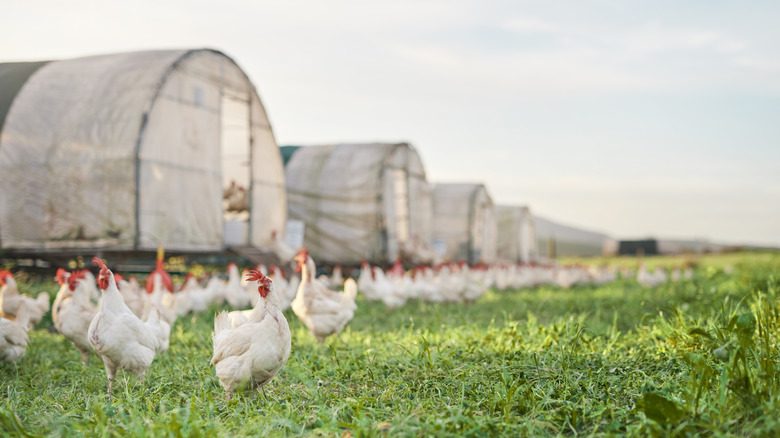There's A Difference Between Pasture-Raised And Cage-Free Eggs
With so many different labels on egg cartons, it can be difficult to decipher what they actually mean. There's grade A and grade AA, large, extra-large, free range, no hormones, and humanely raised ... just to name a few. But when it comes to cage-free and pasture-raised eggs, the labels can sound practically identical. After all, if chickens aren't confined to cages, doesn't that mean they spend their lives roaming green pastures? But the true meaning of these terms, in fact, isn't that simple.
Pasture-raised chickens are pretty close to what they sound like. They get to run around in pastures outside, fairly free of confinement. The term isn't regulated by the United States Department of Agriculture (USDA), but in order to become certified humane by Humane Farm Animal Care (which is an organization recognized by the USDA), the hens must have at least 108 square feet to roam free. In addition, they need to have access to a barn for shelter. Cage-free, on the other hand, is a term regulated by the USDA — but all it means is that the hens are given adequate fresh food and water, and they can move around vertically as well as horizontally within indoor structures. So, technically, the chickens aren't in cages, but they can still be kept in aviaries with limited space.
Should you buy pasture-raised or cage-free eggs?
Whether you should buy pasture-raised or cage-free eggs ultimately depends on what makes the best decision for you and your household, as there are pros and cons to both. According to a study from Penn State, pasture-raised eggs may be more nutritious than other types due to the foraging habits that roaming freely allows the chickens to develop. The study found that eggs from the hens that spent their days in pastures had twice as much vitamin E and long-chain omega-3 fats, and more than twice as many omega-3 fatty acids than those of the commercial-raised hens. The eggs also contained a significantly higher concentration of vitamin A. So, if you're focused on nutrition, you may want to go with pasture-raised. And because their cage-free counterparts get so little space to move around, their eggs may not be anymore nutrient-packed than those of commercially-raised caged hens anyway.
On the flip side, pasture-raised eggs are usually the most expensive variety out there, since it costs more money to give the hens space to roam. Plus, chickens that wander around pastures may eat more than those in small living quarters, which can drive up the cost of their eggs too. Of course, only you can assess your priorities and choose the best type of carton for you, but at least now you know the difference between pasture-raised and cage-free eggs.

